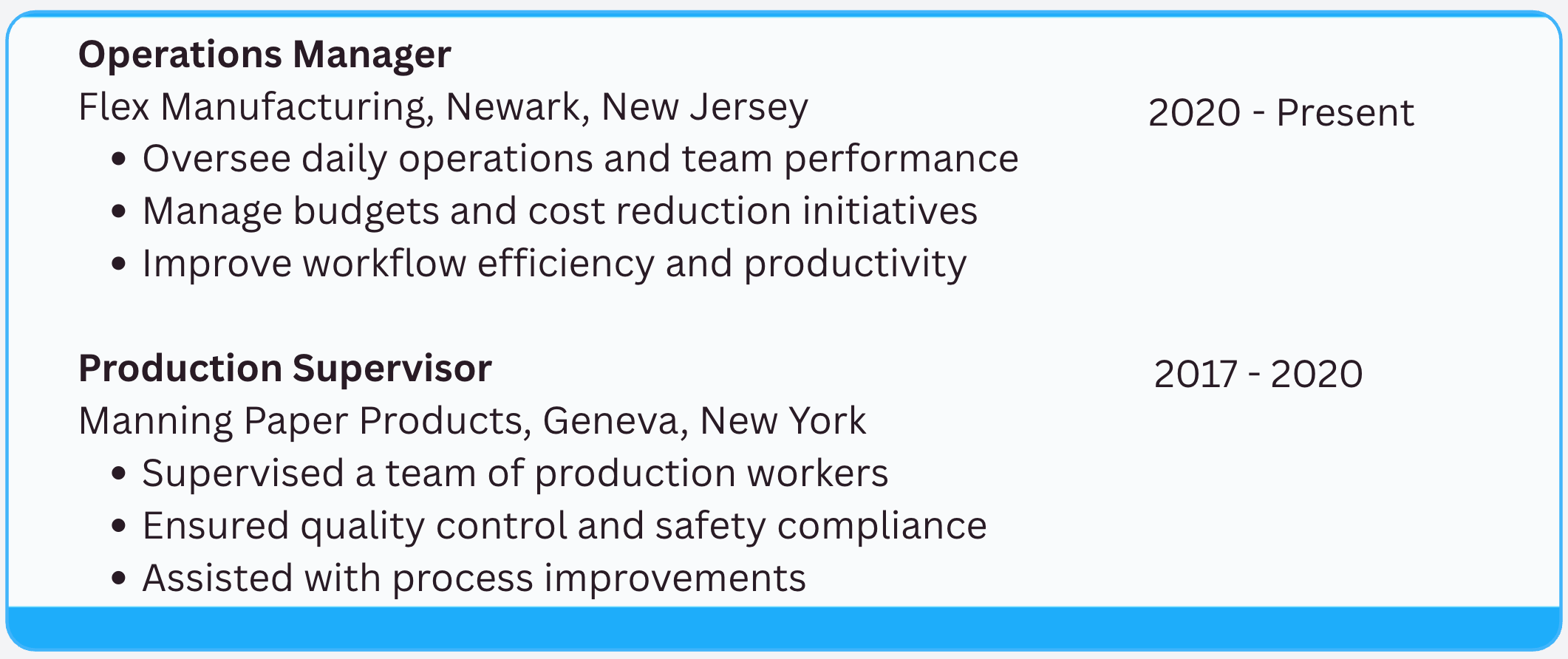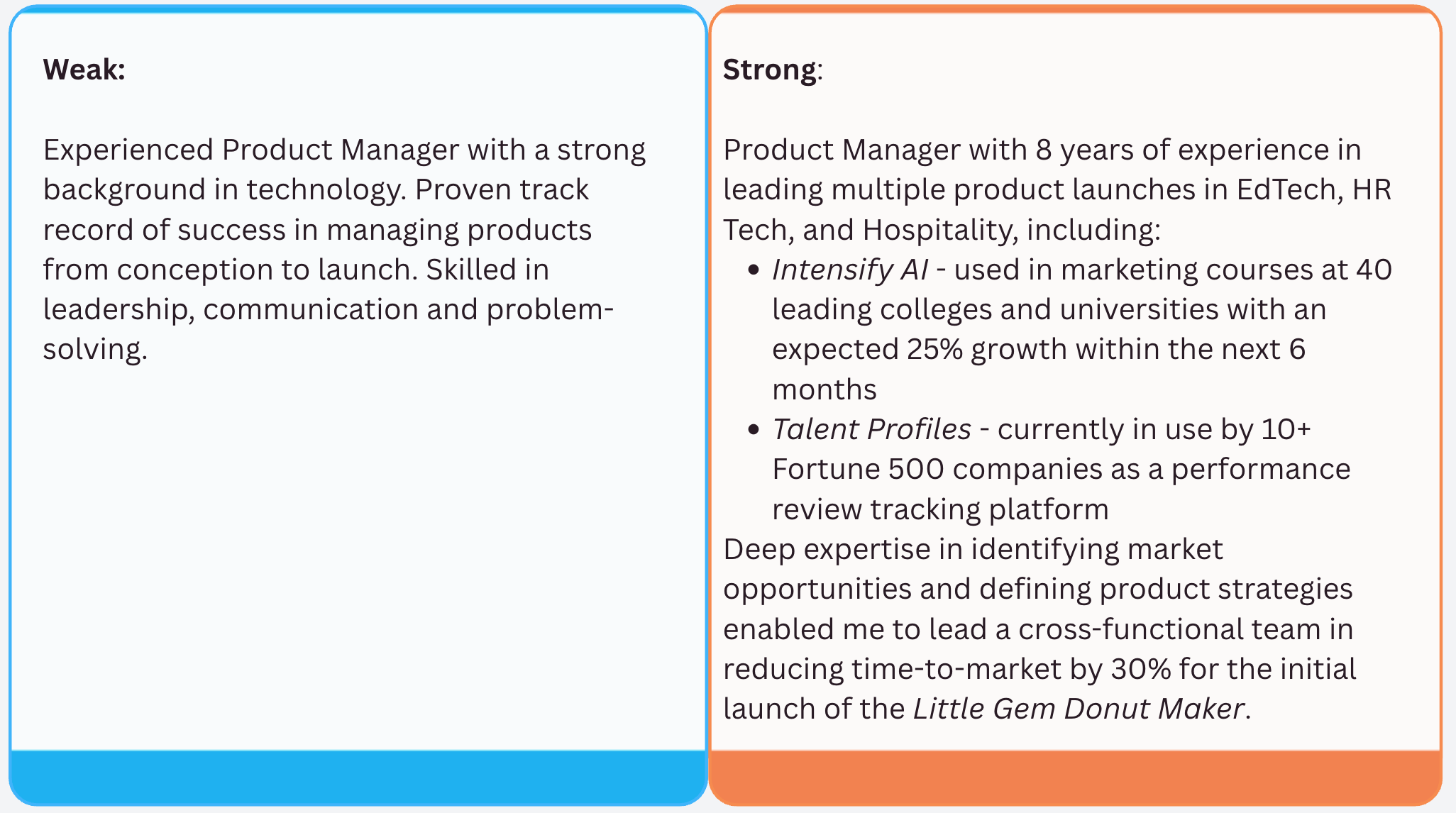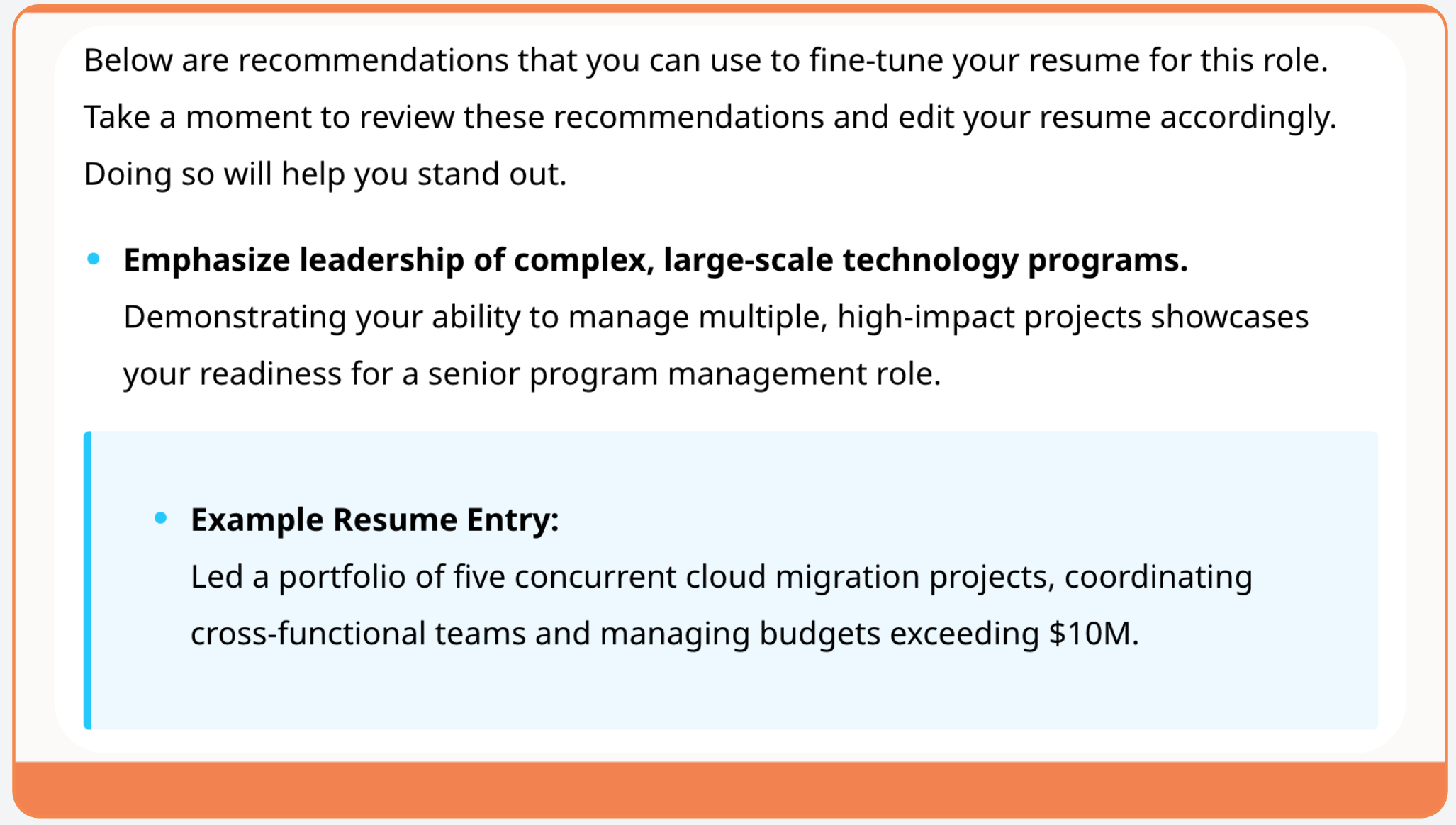Scrap Empty Promises from Your Resume. Stand Out, Don't Blend In!
Foreword
A resume should be a promise to a prospective employer—a commitment that your skills, experience, accomplishments, and potential will bring value to their organization.
This article emphasizes the importance of crafting a resume that goes beyond generic claims and truly reflects one’s achievements. We’ll explore a number of key takeaways to consider when crafting a resume that truly stands out.
In This Article:
- What NOT to do when writing your summary
- Eliminating buzzwords
- Crafting a compelling Professional Work Experience section
- Dealing with the Applicant Tracking System (ATS)
- Showing quantifiable results using realistic numbers that get attention
- Customizing your resume for each role, ensuring that it reflects the right keywords from the job description
Things to Avoid on Your Resume
The Resume as a Promise
A resume is more than just a document that displays your background, relevant skills, and experience. It not only tells the reader who you are and what you can do, but it is also your promise to them that you will add value to their organization.
Unfortunately, too many resumes break that promise. Like this one:

Instead of showcasing potential, this summary is filled with generic claims, contains no achievements, and uses the types of buzzwords that prevent this candidate from standing out.
In today’s competitive job market, it’s not enough to string good-sounding words and phrases together; you must prove your value. A strong resume doesn’t just talk about your skills; it shows them through clear, measurable achievements. Every bullet point in your resume should answer a critical question: "How did you make a difference?”
This article will help you avoid the trap of empty promises and craft a resume that really means something. By focusing on the impact you made, providing both proof and authenticity, you can transform your resume from one that looks like everyone else's into a bold statement of your value.
It’s time to stand out, not blend in.
Why Empty Promises Do Not Work
The "Empty Promise" resume is filled with cliches, a lack of proof, and overused templates that make you ordinary, perhaps even forgettable. Your resume needs clear evidence that you can do the job; without such proof, you risk being passed over before you even have a chance to show your worth.
A resume must stand out and give the person reading it the message that you are worth a longer look. Remember, recruiters typically spend 6-9 seconds skimming resumes. The time they spend can vary depending on how many documents they have to review and whether or not they find one that they want to spend more time on. If the resume is not a powerful statement of accomplishments, they will glance at it and move on.
The Resume Summary Section
What is it that catches a recruiter’s eye? It is the Resume Summary.
It is the first thing they see right after your name and the Job Title you are seeking.
Here is an example of a resume summary that contains empty promises. It doesn’t tell the recruiter very much about the candidate, and after seeing this, they are very unlikely to read any further.

This summary uses words such as
- Experienced
- Proven track record
- Leadership
- Communication
They are all great words, but they are just Empty Promises without actual examples to back them up. These words and phrases are meant to make you look good in the eyes of a reviewer, but often have the opposite effect. They don't tell the reviewer enough about your accomplishments and what you would bring to their company. In fact, this summary may lead them to believe you may NOT have really accomplished very much at all.
🤔 You may be wondering: “I just saw a summary filled with empty promises, but what should a great summary look like?” Don’t worry, great examples will follow in the next section.
Avoid using the following buzzwords in your resume and even in your 30-second elevator pitch to describe yourself and the work you have done. There is a common misconception about them that they help you stand out, but they have the opposite effect and cause you to blend in instead:
- Hardworking & Dynamic – These words lack specificity. They are subjective and don’t demonstrate how you’ve applied these qualities in a professional setting
- Results-Oriented - Employers want to see results. Saying you are results-oriented means nothing unless you back it up with data or accomplishments
- Proven Track Record – Prove it! Provide examples of what you accomplished, especially over time
- Team Player & Strategic Thinker - Words like team player and strategic thinker appear on countless resumes, making yours blend in rather than stand out
- Innovative - Instead of saying you are innovative, showcase an innovative project where, for instance, you introduced a new solution that improved efficiency or revenue
- Self-Motivated & Detail-Oriented - Employers assume candidates already have these qualities. Demonstrating these traits through experience is more powerful than just stating them
Professional Work Experience
The professional work experience section is a vital part of any resume. The following example is simply a list of functions that this person performed. It lacks accomplishment and shows no value added.

Looking at the above image, ask yourself these questions:
- Did this person’s background, knowledge, and experience help the two companies he worked for do better than their competitors?
- Did he demonstrate the skills, abilities, values, and accomplishments that he would bring to his next job?
- How would he make a difference?
- How does he stand out?
📌 As noted above, great examples of professional work experience will be shown in the next section.
Common Mistakes to Avoid: The ATS Dilemma
Do not allow the Applicant Tracking Systems (ATS) to ruin your chances of landing the next job opportunity.
The ATS is designed to filter resumes before a recruiter sees them. If you are submitting a resume that is going through an ATS, use clear formatting, use keywords from the job description, and tailor it to the specific role.
There are some things an ATS is not too good at. Keep the following about the ATS in mind when preparing a resume:
- It will often misread and reject fancy designs and formats
- It will probably reject unusual fonts and font sizes
- It will have issues with pictures, company logos, and images of all kinds
- It will struggle with certain file types (e.g., .jpg, .rtf, .html, .pub, and sometimes even .pdf)
- It will have problems with creative and unusual formatting, such as the use of graphs or tables
- It is often unable to read headers and footers
- It may reject a very large file size (> 500 kB), so please avoid images, logos, and other digital information that use up a lot of memory
Common Mistakes to Avoid: Beyond the ATS
Once you get beyond the ATS, a whole new set of rules applies. The recruiter will now see the resume for the first time.
As we said at the beginning of this article, the reviewer will probably spend less than 10 seconds on the resume. Think about what to leave off your resume, including:
- Outdated and irrelevant experiences. If it happened 15 years ago, don’t include it unless it is absolutely vital to your narrative
- A solid wall of unbroken text. No one wants to read long paragraphs to look for hidden gems
- Spelling mistakes and grammatical errors. Nothing turns off the person reviewing your resume quicker than poor spelling and grammar
- Unnecessary personal information. Your hobbies, political affiliations, clubs, etc. If you must, save them for an open discussion following the interview
- References should not be included in this document, nor should you include a statement such as “references provided upon request” or something similar
- Try not to include items in the resume that take away from the importance of your professional qualifications
- Overloading the resume with too much information.
For example:

Here is a list of skills and capabilities that actually appeared on a resume. Would this list encourage a reviewer to look further into the resume or lead them to believe that this might be more than a bit of an exaggeration on the part of the candidate? And remember, without context, they are just words!
📌 Hang in there, a great example of a meaningful skills list is coming right below!
What You Should Do Instead? Crafting a Resume That Stands Out
Start with the Right Job Title
Ensure that the Job Title you use is the same or very similar to the one in the Job Description. This focuses the reader immediately on you!
Next Comes a Powerful Summary
A summary is a compelling introduction that communicates your value to potential employers.
Let’s take a look at these two resume summaries – which one catches your eye?

The “Weak” example is the very same summary that we looked at earlier. In this case a reviewer might not have any interest in reading the rest of this person’s resume.
The “Strong” summary, however, establishes that they made several positive contributions to their former employer(s). They even mentioned their role in the launch of a well-known brand. This summary has weight! And it is more likely to prompt the reader to want to learn more about this candidate with the expectation it will lead to an interview.
Here are some important concepts to keep in mind when writing a resume summary that enables the writer to stand out to the recruiter and the hiring manager.
- First Impressions Matter – a strong summary immediately grabs attention and sets the tone
- Highlighting Key Strengths – it concisely showcases your most relevant skills, experience, and achievements.. Remember that your strengths lead to achievements
- Providing Specifics - mention specific names of products, certifications, clients, and industries
- What's Unique? – a well-crafted summary positions you as a unique and valuable candidate, you won't blend in with others
- Clarity and Cohesiveness – it ties together your experience and career goals, shows how you fit the role
- Encourage Further Reading – if your summary is compelling, they will be more likely to read the rest of your resume in detail
The following is a summary from a real resume. It is for a payroll specialist, and we consider it a strong summary because it focuses on this person’s achievements. It demonstrates that achievements can be significant no matter what level the person has reached in their career. Based on the job description, they are expected to handle a high volume of work and quickly learn a new payroll system, and the candidate's summary clearly shows her ability to do so.

Show Quantifiable Results
Quantifiable results are essential to any resume, but before we continue, remember that any information you provide in your resume must be accurate and verifiable.
Never exaggerate or inflate this information to make your resume stand out. Too much of a good thing may have the opposite effect and cause a hiring manager to question the information you provide. In fact, such overstated information may also be considered empty promises.
People who review resumes can spot achievements that appear to be exaggerated, unrealistic, and overused.
The following is an example of an exaggerated summary of accomplishments.

Through the use of hyperbole and exaggerated numbers, this candidate managed to dramatically overstate his contributions. Would a reviewer jump at the chance to read the rest of the resume and ask him to come in for an interview based on this summary?
That being said, solid and meaningful accomplishments are still one of the best ways to demonstrate your value to a prospective employer. Using realistic examples such as those shown below will help you to stand out.
Use Specific Numbers
- Instead of saying "increased sales," say "increased sales by 20% in 6 months."
- Instead of "managed a team," say "led a team of 8 employees, improving efficiency by 10%."
- Show before and after impact as in the following: "Reduced customer complaints from 15% to 5% by implementing a new support system" or "Boosted social media engagement by 20% within six months."
- Tie Results to business goals as in "Saved the company $50,000 annually by negotiating better vendor contracts" or "Developed a marketing strategy that resulted in a 25% increase in leads."
If you don't have hard numbers, it is OK to estimate. Here are some examples:
- "Streamlined workflows, cutting project completion time by approximately 30%"
- "Trained new hires, reducing onboarding time by around two weeks."
Always be ready to back up your numbers. They should be realistic, and you should be able to validate them, because the reader will want to hear more about these accomplishments during the interview process. Here is an example of a summary that stands out without exaggeration.

Use Strong Verbs, Replace Passive Language
Consider introducing real accomplishments with strong verbs. Here is a list of some of the introductory words you can use to help describe the accomplishments you have achieved.
- Implemented (e.g., a system)
- Launched (e.g., an initiative)
- Headed (e.g., a department)
- Inspired (e.g., a launch)
- Motivated (e.g., a team)
- Operated (e.g. a facility)
- Oversaw (e.g., a program)
- Coordinated (e.g., an event)
- Introduced (e.g. an improvement)
- Convinced (e.g., stakeholders)
- Presented (e.g., a keynote speech)
These verbs and others like them show a take-charge person who knows how to get things done!
Tailor the Resume for Each Job
In order for your resume to stand out, you must customize your resume to fit the job you are applying for. You want the reader to see you as a great fit, and not just another person who blends in with the crowd.
Here are some suggestions for ensuring your resume matches the expectations of the person who is reading your resume.
1 - Analyze the Job Description
- Highlight keywords, required skills, and responsibilities
- Identify key qualifications that match your experience
2 - Customize Your Summary or Objective
Show how your skills align with the role.
Let's say, for example, you are applying for a marketing manager position. Instead of a generic summary such as:
"Experienced marketing professional skilled in digital campaigns"
consider using:
"Retail industry marketing manager with 5+ years of experience increasing brand engagement by 20% through digital strategies."
3 - Match Your Work Experience to the Job
- Prioritize relevant experience
- Adjust bullet points to emphasize skills that match the job
- Always lead with your best achievement! The first bullet for each company/organization you worked for should emphasize the problems you solved, the money you saved, etc.
4 - Keywords From Job Posting
Whether it is the Applicant Tracking Systems or a pair of human eyes reviewing your resume, if it contains words that match theirs, you are more likely to make it to the next round.
However, when you select words from the job description for your resume, be sure to select those that are the most meaningful to the reader. Although soft skills such as leadership and communication are always important, it is often the hard skills that the reviewer is looking for. The bold words in the following job description for an accountant should be reflected in the work described in the resume.

5 - Practice with Mr. Simon
If you have practiced a Mock Interview with Mr. Simon, you are already aware of the Resume Advice feature, which provides practical guidance, based on your actual answers that you have given during your mock interview session, on how to make the information on your resume stand out.
One of our users, who was practicing for the position of Infrastructure Project Manager, kindly shared this resume advice he had received from Mr. Simon:

In this example, Mr. Simon emphasized the individual’s experience with large-scale cloud infrastructure projects, and summarized a strong, very substantial statement to be used in the Professional Experience section of the resume.
Conclusion
A strong resume doesn’t just list experiences. It promises the reliability and impact you will bring to their organization. It does this in the following ways:
- Demonstrates the value you brought to your former employers and makes a strong case for what this will mean to their organization
- Highlights your growth and advancement during your career and how well you will be able to take on the responsibilities of the new job
- Tells the story of how your skills and dedication led to your success and how you will bring these attributes to your target role. It tells them that they will be able to rely on you not only to deliver on promises but also to create new opportunities for yourself and your employer
- By focusing on these key areas, you can craft a resume that speaks to both your integrity and your ability to capitalize on new challenges, setting you apart in the job market
Ultimately, Empty Promises, as described in this article, serve as both a warning and a call to action.
We urge you to avoid meaningless promises and focus on tangible, quantifiable proof of your contributions. By doing so, you will enhance your job prospects and build credibility and trust with potential employers.
You don't have to be alone in your job search!
Mr. Simon invites you to join the Friends of Mr. Simon Meetup Group that supports both individuals seeking their next job role and working professionals. Members of our network come together to learn and practice new skills and network with others through our regular interactive events where they establish meaningful connections and have a chance to promote their personal brand and stand out in the marketplace.
Group membership is free of charge, courtesy of Mr. Simon.
Join our Friends of Mr. Simon Meetup Group to become part of our growing and supportive community!
